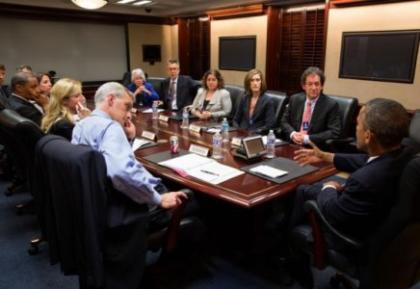Shutdown deal funds secrecy panel few people know about
Buried in this week’s deal to reopen the government is funding for a little-known panel to oversee the National Security Agency’s surveillance programs.
PCLO Board meets with President Obama.
The Privacy and Civil Liberties Oversight Board (PCLOB) has become almost legendary in Washington circles for its obscurity—and the lack of any meaningful funding it has received for a group that is supposed to watch the watchdogs at the NSA.
But early Thursday morning, the board received the money it requested this year, when President Barack Obama signed the shutdown and debt-ceiling deal.
Buried in the agreement on page 14 was $3.1 million for PCLOB to fund its operations.
It took six years, which is slow even by Washington’s standards, to get five people approved for the PCLOB by May 2013.
In June, board chairman David Medine acknowledged that PCLOB didn’t have a website yet or a permanent office in Washington. Its funding had been cut from $2 million in 2008 to $900,000 for 2013.
Based on information on the PCLOB’s new website (which, to its credit, seems to work fine), PCLOB has at least five employees, based on information it supplied about its shutdown plans. And it now appears to have an office.
But the group had to cancel a long-awaited public event on October 4, because most of its witnesses were furloughed.
In a mid-summer report, PCLOB had asked for $3.1 million for the new fiscal year, an increase of more than 300 percent. The board said it needed the extra money to pay its full-time chairman and several employees, and to execute a plan of operations.
The board also wanted the extra funds to pay for some information technology upgrades. That could include an enhanced email system.
The Washington Post noted in September that an invitation to the media for that postponed October 4 event inadvertently disclosed the email addresses of staff members at the Director of National Intelligence, National Security Council, FBI, Justice Department, Treasury, and Pentagon.
Officially, PCLOB’s job is to provide oversight guidance, as an independent agency of the executive branch, about the activities of the NSA, government surveillance in general, and the secret court known as FISC.
PCLOB’s meeting notices are posted in the Federal Register, when they do occur. There have been two public meetings in the past year and a public workshop that was videotaped by C-SPAN. The board has also met several times behind closed doors, including a meeting with President Obama.
The board also has formally asked Attorney General Eric Holder and Director of National Intelligence James Clapper to update guidelines “governing collection, retention, and dissemination of information concerning United States persons.”
In a separate letter, the PCLOB called those guidelines “extremely dated.”
Whether the board has the power to do more than offer critiques about the NSA and the DNI remains to be seen.
Officially its mandate is to “review and analyze actions the executive branch takes to protect the Nation from terrorism, ensuring the need for such actions is balanced with the need to protect privacy and civil liberties.”
But Senator Patrick Leahy wants the give the board subpoena power to investigate issues about privacy and national security, as part of legislation he’s sponsoring with Patriot Act author James Sensenbrenner.
Currently, the board can only ask the attorney general to issue subpoenas on its behalf.
Scott Bomboy is the editor in chief of the National Constitution Center.
Recent Constitution Daily Stories
Does the First Amendment protect hate speech on Facebook?
Dershowitz throws the Constitution, figuratively, at Ted Cruz

